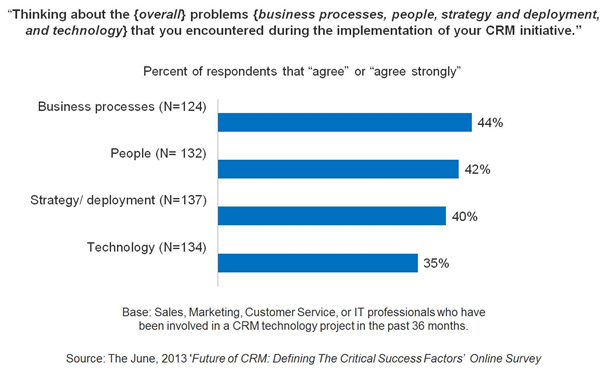How To Succeed With CRM: The Critical Success Factors
To succeed in the age of the customer, business and IT leaders that that support “front-office” business processes cannot afford failed technology initiatives. CRM technology projects can be costly, affect many employees within the organization, and can suffer from a lack of vendor support.
To understand the types and prevalence of the pitfalls that you need to navigate, I recently did a survey of CRM practioners. Working in partnership with CustomerThink, Forrester collected opinions from over 500 individuals who had been involved in a CRM technology project as a business professional in Sales, Marketing, Customer Service, or IT within the last 36 months. Respondents evaluated 88 project risk factors, in four categories: strategy (business goals and objectives); process (procedures and business rules); technology (applications and infrastructure); and, people (organizational structure, skills and incentives).
I will report our findings in more detail in up-coming blogs, but here are some initial insights.
To achieve CRM technology deployment success requires a balanced approach. Focus on all four fundamental success factors:
- Process. Nearly half (44%) agreed their CRM projects faced problems grounded in: poor or insufficient definition of business requirements; inadequate business process designs; and, the need to customize solutions to fit unique organizational requirements.
- People. More than two-fifths (42%) agreed that their problems were “people” issues: such as slow user adoption; inadequate attention paid to change management and training; and, difficulties in aligning the organizational culture with new ways of working.
- Strategy. Two-fifths (40%) agreed they had the challenges related to CRM strategy, such as: a lack of clearly defined objectives; poor solution deployment practices; and insufficient solution governance practices.
- Technology. Only about one-third (35%) agreed they had technology deficiencies such as: data problems; functional shortfalls in vendor solutions; lack of the required skill sets needed to implement the solution; system performance shortfalls; and, poor usability.

What does this mean?
Yes, CRM technology is incredibly important as a foundation to support the capabilities your organization needs to deliver differentiated customer experiences. But, the biggest challenge is not the technologies or vendor solutions that you choose to deploy.
The hard work is redesigning your business processes so they add value for customers. And, you need to invest in, support, and engage with employees to adopt new work practices that deliver your customer value proposition.